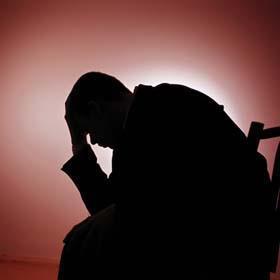Double HIV, TB diagnosis depresses Vhembe man

 “I’ve been living with TB for three years and I had come to terms with my condition,” Erick tells OurHealth. “But when I found out recently that I am HIV-positive, it put a lot of pressure on me.”
“I’ve been living with TB for three years and I had come to terms with my condition,” Erick tells OurHealth. “But when I found out recently that I am HIV-positive, it put a lot of pressure on me.”
“I get scared sometimes and start to think that I am dying and that I stand no chance of surviving this situation,” adds Erick, who lives in Ngalavhani village.
Tuberculosis treatment usually takes about eight months usually but the illness can come back. Multi- or extensively drug-resistant TB treatment can take about two years or more.
His wife, Margaret Mudanalo says she has noticed the change in Erick after he found out about being HIV-positive.
“He’s a very strong man, but testing positive for HIV hit him hard,” Margaret says. “He finds it difficult to accept that it is possible for a person to be infected with more than one virus or disease at a time.”
“I try to give him all the support a man needs from his wife, but sometimes it’s difficult because he distances himself from me and it is not good for our family,” she adds.
But the majority of TB patients in South Africa are just like Erick. According to the Department of Health, about 60 percent of all TB patients are also living with HIV.
While most people carry TB, only about ten percent of people will ever develop active TB. However, with compromised immune systems, people living with HIV are about 40 times more likely to develop active TB, which remains a leading killer of HIV-positive people globally.
Because many TB patients are, like Erick, living with two diseases, the Department of Health recommends TB patients are offered HIV testing – and that HIV and TB services are offered together.
Mashudu Nekhavhambe, a staff member at Matavhela Clinic says Mudanalo is recovering well on his TB treatment. Nekhavhambe says he hopes he will continue to show up for his treatments like he always has.
“We know that it is not easy for someone to find out that they are HIV-positive,” Nekhavhambe tells OurHealth. “It takes time to get used to the idea, and because people are different, some accept their status sooner than others.”
“The most important thing is for us to see that all our patients are taking their antiretrovirals (ARVs) regularly and properly,” adds Nekhavhambe.
Erick has not completely lost hope though.
“The home-based care people come around to check on me twice a week,” he says. “They are always advising me to keep on taking the TB treatment and to also start to take ARVs.
“I used to think that when someone was HIV-positive it meant they had AIDS but the home-based care people have helped me understand that HIV is just a virus and it can be managed,” he adds. “I find it very hard to cope with both HIV and TB but with all the support I am getting from the clinic, home-based care workers and my family, I believe I will be fine.”
Author
Republish this article
This work is licensed under a Creative Commons Attribution-NoDerivatives 4.0 International License.
Unless otherwise noted, you can republish our articles for free under a Creative Commons license. Here’s what you need to know:
You have to credit Health-e News. In the byline, we prefer “Author Name, Publication.” At the top of the text of your story, include a line that reads: “This story was originally published by Health-e News.” You must link the word “Health-e News” to the original URL of the story.
You must include all of the links from our story, including our newsletter sign up link.
If you use canonical metadata, please use the Health-e News URL. For more information about canonical metadata, click here.
You can’t edit our material, except to reflect relative changes in time, location and editorial style. (For example, “yesterday” can be changed to “last week”)
You have no rights to sell, license, syndicate, or otherwise represent yourself as the authorized owner of our material to any third parties. This means that you cannot actively publish or submit our work for syndication to third party platforms or apps like Apple News or Google News. Health-e News understands that publishers cannot fully control when certain third parties automatically summarise or crawl content from publishers’ own sites.
You can’t republish our material wholesale, or automatically; you need to select stories to be republished individually.
If you share republished stories on social media, we’d appreciate being tagged in your posts. You can find us on Twitter @HealthENews, Instagram @healthenews, and Facebook Health-e News Service.
You can grab HTML code for our stories easily. Click on the Creative Commons logo on our stories. You’ll find it with the other share buttons.
If you have any other questions, contact info@health-e.org.za.
Double HIV, TB diagnosis depresses Vhembe man
by suprisenemalale, Health-e News
November 29, 2013
MOST READ
Hunger and mental health: study looks at how families cope with food insecurity
There’s more to self-care than scented candles or massages, it’s a key public health tool
Access to clean water and stable electricity could go a long way to addressing rising food poisoning in SA
Prolonged power outage leaves hospitals in the dark for two days
EDITOR'S PICKS
Related


Limpopo villagers call for counselling centres after sprouting taverns fuel drinking problems

